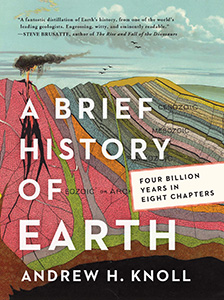 Andrew H. Knoll, A Brief History of Earth: Four Billion Years In Eight Chapters (New York: HarperCollins, 2021), 260pp.
Andrew H. Knoll, A Brief History of Earth: Four Billion Years In Eight Chapters (New York: HarperCollins, 2021), 260pp.
Once there was nothing, but now there is something — the cosmos. "In the beginning," writes Andrew Knoll, "... well... a jot, a speck, a fleck at once incomprehensibly small but unimaginably dense. It wasn't a localized concentration of stuff in the vast emptiness of the universe. It was the universe. How it got there, no one knows." And what came before? That's "equally mysterious."
Today when scientists play the tape of cosmic history backward, we know that the Big Bang 13.8 billion years ago gave birth to the universe and "unleashed an immense outward tide of energy and matter." Skipping over the first nine billion years of that cosmic history, Knoll's "biography" of the earth begins 4.6 billion years ago with the birth of our planet in a "nondescript galaxy called the Milky Way." It really is, as the dust jacket says, a story worthy of a Hollywood blockbuster.
In eight succinct chapters Knoll reconstructs the story of earth through a process of historical inquiry. The empirical evidence that we have includes things like marine fossils on top of Mt. Everest, four-billion-year-old meteorites that have fallen to earth, air bubbles trapped in ancient Antarctic ice, the 125-mile wide meteorite crater in the Yucatan Peninsula that precipitated one of earth's five mass extinctions, 3.7-million-year-old footprints in Tanzania, and the discovery of carbon-14 dating that enables scientists to calibrate time.
This historical record of the cosmos gives us significant but limited information, and scientists can interpret it differently. Knoll does a good job of explaining the nuances of conventional views that enjoy widespread consensus, alternative and unorthodox hypotheses, questions about which there are vigorous debates and controversy, and the subjects that provoke "all manner of conjecture." In his last chapter called "Human Earth," he moves from historical inquiry to moral exhortation. We humans are profoundly transforming the earth in significant ways —"the big story going forward is global warming." And so he challenges us "to do something about it."
Andrew Knoll is the Fisher Professor of Natural History at Harvard University. For more on this subject see the books by Robert M. Hazen, The Story of Earth: The First 4.5 Billion Years, From Stardust To Living Planet (New York: Viking, 2012), 306pp; and Elizabeth Kolbert, The Sixth Extinction; An Unnatural History (New York: Henry Holt, 2014), 319pp.
Dan Clendenin: dan@journeywithjesus.net


